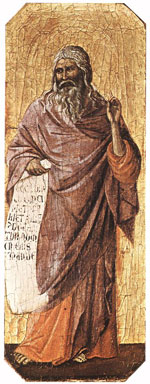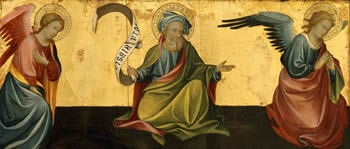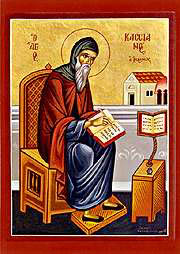
|
Perfection is the Voice of the Oppressor:
A Spirituality of Imperfection
For Sunday February 8, 2009
Lectionary
Readings (Revised Common Lectionary, Year B)
Isaiah 40:21–31
Psalm 147:1–11, 20c
1 Corinthians 9:16–23
Mark 1:29–39
 |
Isaiah, by Duccio di Buoninsegna, 1308-11, tempera on wood. |
In the Old Testament reading this week Isaiah depicts a mighty God enthroned in the heavens who looks down on humanity as so many tiny grasshoppers. His God "brings princes to naught and reduces the rulers of this world to nothing; he blows on them and they wither, and a whirlwind sweeps them away like chaff." Turning his gaze to the night sky, Isaiah worships this God who "brings out the starry host one by one, and calls them each by name. Because of his great power and mighty strength, not one of them is missing."
But Isaiah's mighty God, so Absolutely Other, does not disregard the lowly, the insignificant, the obscure or the unimportant. Be assured, he writes, that your way is not hidden from God. His mighty power is matched by his tender love. Unlike us, he never grows weary or tired; his empathy and understanding of our human frailties knows no boundaries. Isaiah acknowledges that you might be weary and weak, tired and faint, that even vigorous youth sometime stumble and fall, "but those who hope in the Lord will renew their strength."
A few years ago I started reading at some length in the desert monastics of fourth century Egypt. Before I started reading them, I thought of them as Christian super-heroes. After I read them, I realized that I couldn't have been more wrong.
Given that these oddball saints are so far removed from our own time, place, culture, and even (or especially) our practice of the Christian life, I kept wondering what drew me to them other than historical curiosity. A thousand pages later I realized that I loved them for what John Chryssavgis calls their "spirituality of imperfection." They made me feel very much at home with my own many imperfections.
 |
Isaiah with Two Angels, Gherardo di Jacopo Starnina, about 1410, tempera on panel. |
If society's holy grail of perfection — moral, spiritual, financial, physical, psychological, familial, vocational, whatever — is ultimately the "voice of the oppressor" (Anne Lamott), and I believe that it is, then these desert eccentrics pointed me to the liberating practice of embracing brokenness without shame or embarrassment — my own, other's, and even the world's. They told stories that explained myself to myself.
The early ascetics fled the corruption of church and society to seek Christ in the lonely solitude of the remote desert. If you have spent any time in a real desert, and I have, you can imagine the intensity and severity of their chosen orientation. Sometimes they lived in communities, while others chose "open combat" as solitary hermits. They sought what John Cassian (360–430) called "integrity of heart" or "integral wholeness." Seeking personal transformation and not mere theological information, they favored the voice of experience over theoretical claims, and human healing over book learning. But the conclusions of their spiritual experiment are not what you might expect.
 |
John Cassian. |
With a fascinating mixture of remarkable candor, brutal realism, unqualified empathy, and wry humor, they describe how they experienced in the vast nothingness of the Egyptian desert a cacophony of voices in the interior geography of the heart. They sought wholeness but discovered brokenness. In the famous words of Saint Anthony the Great (251–356), the father of monasticism, they concluded that we should "expect trials until your last breath." Their reports from the front lines of spiritual battle reveal a disarming transparency, "without any obfuscating embarrassment," and that never "despises anyone in belittling fashion" for human failure and frailty.
As I review what I underlined in Cassian's Institutes and Conferences, for example, here is a sampling of their self-diagnosis — lethargy, sleeplessness, unsettling dreams, impulsive urges, self-justification, seething emotions, sexual fantasies, pious pretense that masked as virtue, self-deception, clerical ambition and the desire to dominate, crushing despair, confusion, wild mood swings, flattery, and the dreaded "noonday demon" of acedia ("a wearied or anxious heart" that suggests close parallels to clinical depression).
Saint Anthony the Great, 16th century Russian icon. |
And if that were not sufficiently unnerving, Cassian further admits that "there are [also] many things that lie hidden in my conscience which are known and manifest to God, even though they may be unknown and obscure to me." So, it's even worse than you can know.
Cassian gives many of the most practical examples. He wondered why a monk who joyfully renounced great wealth later succumbed to intense possessiveness or irascibility over a tiny pen knife, needle, book, or pen. He observed monks giving each other the "silent treatment." What provoked a brother's anger at a dull stylus?
Or consider his description of a church service that included "spitting, coughing or clearing our throat or laughing or yawning or falling asleep." Or why is it, Cassian's friend Germanus asked his elder, "that superfluous thoughts insinuate themselves into us so subtly and hiddenly when we do not even want them, and indeed do not even know of them, that it is very difficult not only to cast them out but even to understand them and to catch hold of them?" Where, in other words, was the off-switch for a psyche in overdrive? Why all the involuntary internal garbage?
Despite their unrelenting realism about human foibles, the desert mothers and fathers didn't live like helpless or hopeless victims. Far from it. They exuded confidence in God's unconditional love, exhibited tenderness and patience toward one another and to their own selves, steadfastly avoided the faintest hint of judgementalism, rejected every manifestation of extremist zeal, and chose not to compare themselves with others or even to be overly anxious about their progress.
 |
Mother Syncletica. |
These desert dwellers believed that we can make genuine progress through vigilance and trust in God's grace, even though, paradoxically, the more you mature the wiser you become regarding your own fault lines. "We are," concluded Cassian, not angels but "only human beings." So, advises Mother Syncletica (died c. 400), "we sail on in darkness," confident in Isaiah's reminder that our way is never hidden from a God who is infinite in his understanding and unconditional in his love.
For further reflection:
* In what sense do you agree or disagree with Lamott that "perfection is the voice of the oppressor?"
* Consider the ways we often deal with imperfections — denial, shame, blame, judgementalism, self-justification, pious cliches.
* Contemplate the "saying" of Saint Anthony: "Expect trials until your last breath."
* Why do Christians sometimes "shoot their wounded?"
* For further reflection: John Chryssavgis, In the Heart of the Desert; The Spirituality of the Desert Fathers and Mothers.
Image credits: (1) World Gallery of Art; (2) Museum of Fine Arts, Boston; (3) OrthodoxWiki.org; (4) "Come and See" Icons, Books, and Art; and (5) St. Mary Magdalen Orthodox Church, New York, NY.





